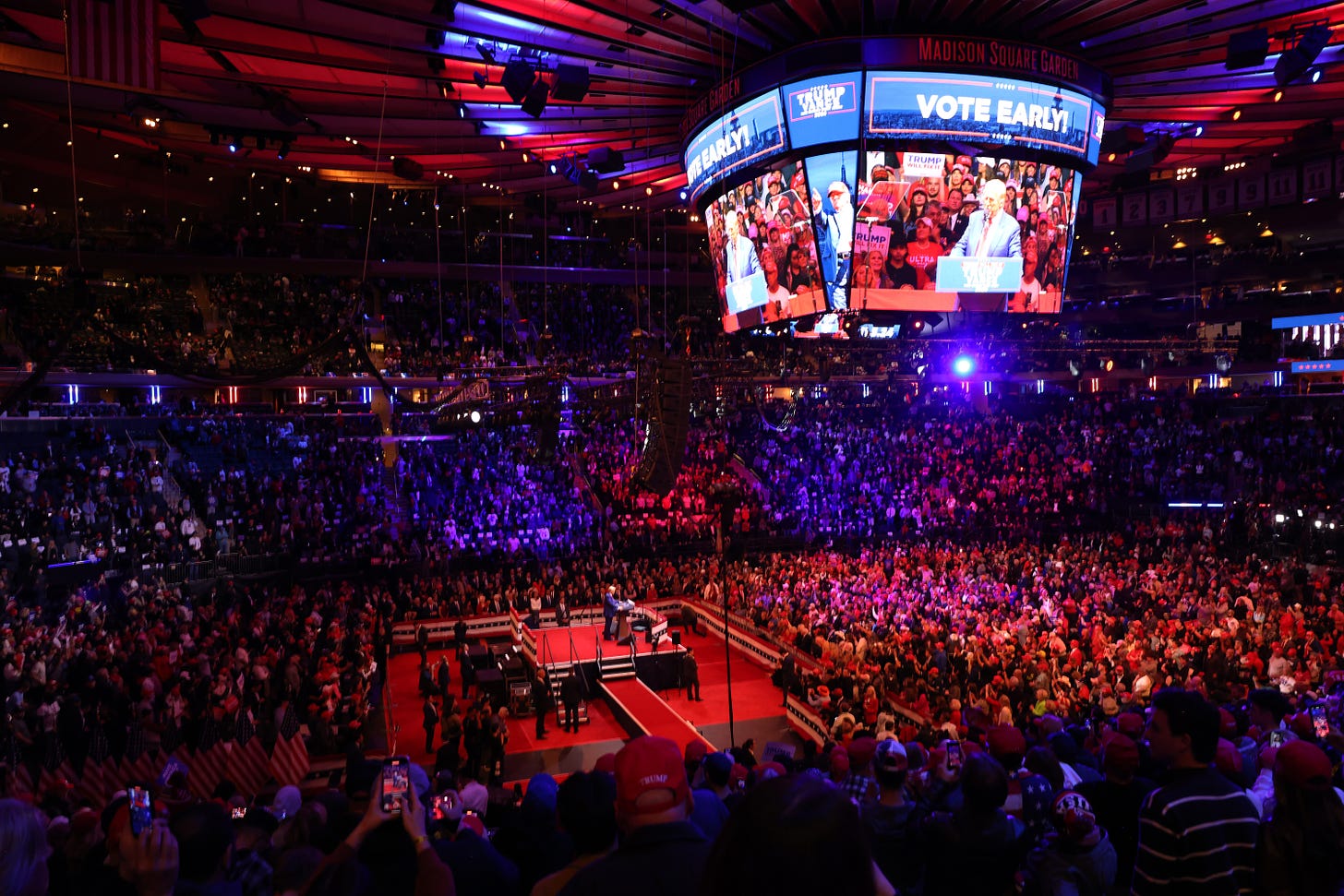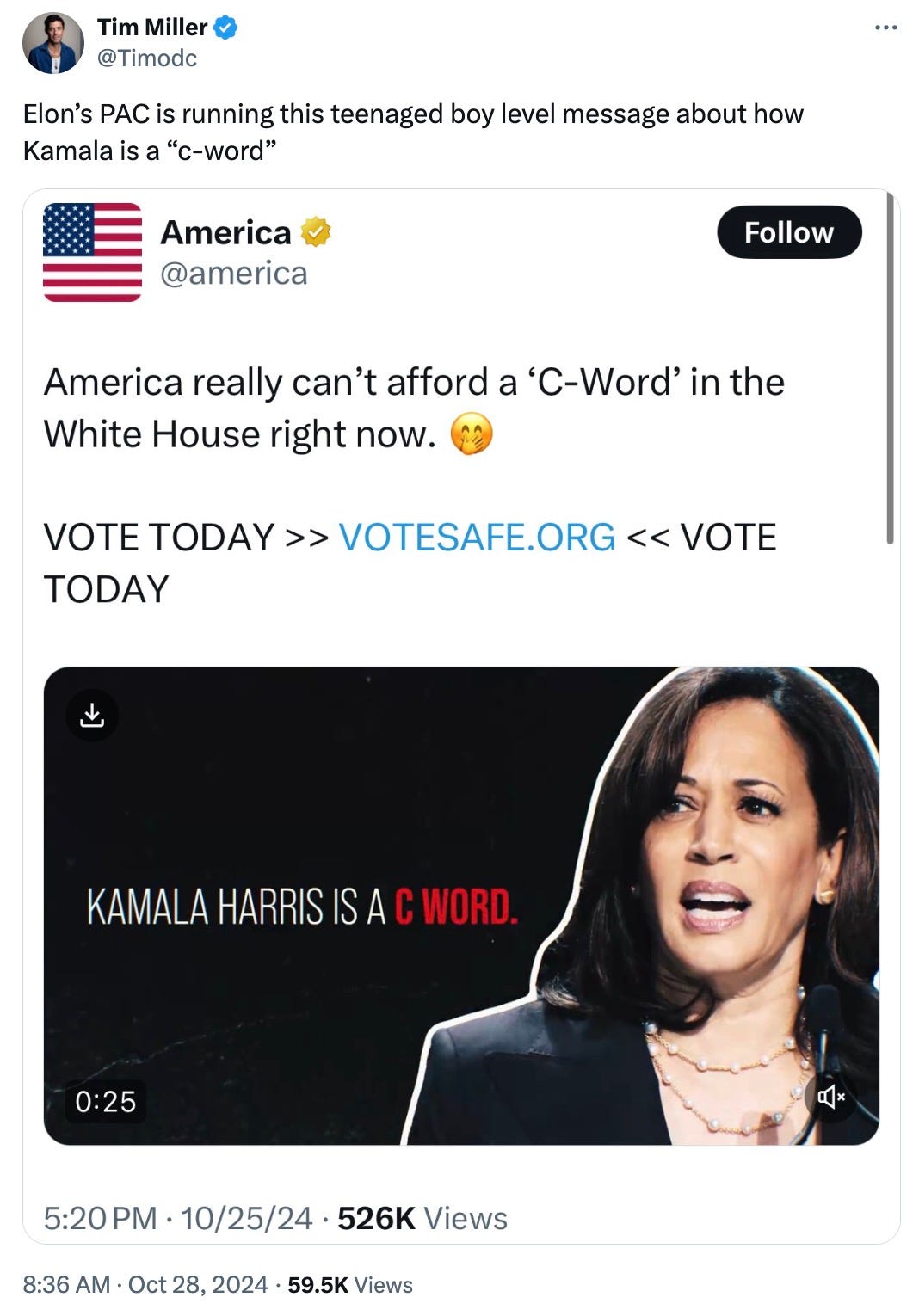
A Hatefest at the Garden
The ugly spectacle on display last night was the closing pitch the Trump campaign wanted you to see.
Lots of good stuff coming down the pike: Sarah will be going live tomorrow evening at 9 p.m. ET in the Substack mobile app for a chat with Dan Pfeiffer, former White House communications director and now author of the Message Box to discuss the last week of the race. If you miss it, it’ll be up the next day at the homepage. Head over to TheBulwark.com/events for more details.
And you won’t want to miss The Bulwark Podcast today, featuring Tim’s experiences from MSG—and an interview with Robert Kagan, who recently resigned from his editor-at-large position at the Washington Post. Happy Monday.

Their Ugliest Foot Forward
by William Kristol
It was quite the hate fest the Trump campaign put on last night at Madison Square Garden.
Some “comedian,” selected and vetted by the Trump campaign, warmed up the crowd: “There’s literally a floating island of garbage in the middle of the ocean right now. I think it’s called Puerto Rico.” Just to make sure people didn’t miss the point, he also crudely mocked Latino Americans in general, and “joked” about black Americans carving watermelons instead of pumpkins this Halloween.
Some talk radio guy—selected and vetted by the Trump campaign—called former secretary of state Hillary Clinton “a sick son of a bitch” and Democrats “a bunch of degenerates. Lowlifes. Jew-haters and lowlifes. Every one of ‘em.”
Some man grasping and waving a cross screamed from the stage: “Kamala Harris is the devil! She is the Antichrist!” (Again: This was a speaker selected and vetted by the Trump campaign.)
Not to be outdone by these nobodies, top Trump aide Stephen Miller worked himself up into a pitch of nativist frenzy: “America is for Americans and Americans only.” (What a minor nation in world history we would have been had this been our policy for the last couple of centuries! Somewhere backstage, Elon Musk and Melania Trump waited for their turn to speak.)
In addition, Miller said of the assassination attempt against Trump: “They also tried to take his life.” The unspecified “they”: always a favorite of demagogic conspiracists. Miller wasn’t the only speaker to adopt this construct.
Leading Trumpist thinker Tucker Carlson weighed in later, explaining there was no way “a Samoan Malaysian low-IQ” candidate like Kamala Harris could win 85 million votes. (That’s about the number of votes Harris is likely to get, which—in the event she wins—Carlson and the Trump campaign will spend the next two months insisting was impossible as they try to overturn the results.)
Trump himself didn’t shy away from demagogic incitement, especially as you’d expect against dark-skinned immigrants. “A lot of people are coming from the Congo prisons,” he declared on stage. But he was also happy to attack Americans of any color or national origin who oppose his campaign: “They are indeed the enemy from within,” and “the most sinister and corrupt forces on earth.”
This was the grand finale of the Trump campaign, personally insisted upon by him, paid for and produced by his campaign. This wasn’t Trump appearing at an event sponsored by a wacky local party or a goofy affiliated group, where the crazed speakers were locally produced farm-to-table types. This was 100 percent Grade-A Trumpism. This is what they wanted people to see.
Last night, at Madison Square Garden, they presented to us Donald Trump’s vision for America.
But Madison Square Garden also evokes another vision for America. On May 8, 1970, Knicks center Willis Reed, suffering from a torn thigh muscle and not expected to be able to play in the NBA championship series’ decisive seventh game, hobbled onto the court as his teammates warmed up. Reed started the game, made the Knicks’ first two field goals, and inspired the crowd and his teammates, who proceeded to defeat the Lakers and secure the underdog Knicks the championship.
Willis Reed was a black man from Louisiana who’d attended Grambling, the famed historically black college. His teammates included Bill Bradley, a Princeton and Oxford-educated Midwestern banker’s son; Dave DeBusschere, a Catholic kid from Detroit; and Walt Frazier, who learned basketball on a dirt playground at his all-black segregated Atlanta school. The Knicks coach was Red Holzman, born on New York’s Lower East Side in 1920, the son of Jewish immigrants from Romania and Russia. That America is the America some of us see when we think of Madison Square Garden.
It is therefore tempting to avert our eyes from the ugly spectacle that was imposed on us at the Garden last night. But looking away won’t cut it. The only way to get beyond Trumpism is to defeat it.
Keeping the Authoritarianism Quiet
by Andrew Egger
Over the last week, two billionaire newspaper owners—Jeff Bezos and Patrick Soon-Shiong—have overruled their editorial boards to squelch endorsements of Kamala Harris. Bezos’s decision came just hours before executives at his aerospace company Blue Origin met privately with Trump himself.
Meanwhile, a clutch of top plutocrats were huddling beachside at the Waldorf Astoria in Dana Point, California, wringing their hands over “how to protect themselves and their companies if Trump wins the presidency,” the Washington Post reports.
Team Trump’s message to these titans of industry: You’re right to worry. “I’ve told CEOs to engage as fast as possible, because the clock is ticking,” a Trump adviser told the Post. “If you’re somebody who has endorsed Harris, and we’ve never heard from you at any point until after the election, you’ve got an uphill battle.”
Over the weekend, JVL wrote two bangers capturing this dynamic of elite pre-surrender to Trump, describing how his open promises of lawless rule have led us to this moment. But I want to stress a different point.
What’s alarming isn’t just the prospect that Trump will brazenly violate the law to punish companies he’s decided are his enemies. It’s that he may not even have to. Trump’s proposed mega-tariff economic agenda will give him all the arm-twisting authority he needs to bring America’s moguls to heel.
When we’ve critiqued Trump’s plan to make the federal government run on tariffs in the past, we’ve mostly focused on his cockamamie economic thinking.1 But a massive across-the-board increase of federal tariffs would also mean a massive increase in the president’s discretionary control over various parts of the economy through the distribution of waivers and exclusions.
Trump habitually waves away arguments that his tariffs could damage U.S. companies by pointing to the president’s ability to grant carveouts. “I gave Apple an exception. Tim Cook is a great businessman,” he said at the Economic Club of Chicago earlier this month. “I did it for many companies . . . we do it for small businesses too.”
To punish Harris-backing CEOs, all Trump has to do is hurt their companies with onerous new trade policies, then decline to pick up the phone when they petition for relief.
And just to remind you: A re-elected Trump would likely be able to put his tariff agenda in place without a single additional word of federal legislation.2
Trump might forgo the scalpel for the hatchet, of course, choosing to go after his corporate foes in a more explosive, less legally defensible way. But what I’m trying to suggest is that even explicit economic retribution for political activity Trump dislikes might not look like open authoritarianism. The country may well continue its slide into quasi-dictatorship in much the same style as it has so far: with a whole ecosystem of Trump abetters rolling their eyes and scolding you for making such a fuss, even as it happens.
Israel Hits Back
by Will Selber
On Saturday morning, the Israeli Air Force conducted a complex and successful series of strikes against targets in Iraq, Syria, and Iran. More than 100 aircraft, including the IAF’s advanced F-35 joint strike fighter, struck Iran’s integrated air defense network as well as three bases where the Iranian Revolutionary Guards Corps develops missiles, explosives, and some nuclear-weapons-related technology. All of the IAF’s aircraft returned without incident. Iranian sources reported that four soldiers were killed in the strike; no civilians appear to have been harmed.
The IAF’s strikes were a response to Iran’s early October ballistic missile attack on Israel and Hezbollah’s failed assassination attempt on Israeli Prime Minister Benjamin Netanyahu. The operation showed why the IAF is the envy of the region; Iran’s air force was no match.
Israel’s strikes, which Netanyahu described as “precise and powerful,” were likely intended to restore deterrence and pave the way for future strikes. Further, the IAF likely hindered Iran’s ability to produce more ballistic missiles, which will help not only Israel’s security but also Ukraine’s. While Iran downplayed the severity of the attack, over the past few months, its major proxies in Gaza and Lebanon have been severely diminished and its ballistic missile attacks have largely failed.
Nevertheless, Iran is likely to respond. How and when is anyone’s guess. The Islamic Republic’s options are limited, with the most obvious choices being another ballistic missile attack or more asymmetric strikes against Israeli interests (to include Jewish civilians of any nationality) across the globe.
Although the United States did not participate in the attack, it almost certainly provided intelligence and operational support, including a pledge to rescue any downed Israeli pilot. Yet again, the IDF and the DoD relationship remains rock solid despite the bad blood between Netanyahu and President Biden.
Iran’s lack of options for reprisal suggests that another round of escalation is somewhat unlikely, at least for now. But that could change with the presidential election. If Donald Trump returns to the White House, Netanyahu could feel more empowered to strike at Iranian nuclear or oil sites, which Biden has discouraged. Despite new rounds of ceasefire talks, Israel shows no signs of letting up on Hamas or Hezbollah.
Quick Hits
THIS SHOULD END WELL: There’s lots of alarming news out there these days. But we couldn’t help but let our minds wander to dark places when we read this item from the New York Times:
A memo circulating among at least half a dozen advisers to former President Donald J. Trump recommends that if he is elected, he bypass traditional background checks by law enforcement officials and immediately grant security clearances to a large number of his appointees after being sworn in, according to three people briefed on the matter.
Obviously, it would behoove us to have people in key government posts go through rigorous background checks. The idea that you wouldn’t want this suggests, maybe, that you’re a tad bit worried about what those background checks might turn up.
NYT POLLING DATA THAT WON’T SEND YOU INTO AN EMOTIONAL SPIRAL: The trendlines have been pretty steady in recent weeks: slight gains for Trump but nothing that would suggest anything but a tossup race. That’s been enough to freak out Democrats, who need data to fill the pits of anxiety within them. Today’s New York Times/Siena College poll should give some relief—via, of all things, a sampling of Nebraska. Turns out, Harris is doing far better in the second district (Omaha) than Biden did in 2020. She’s doing surprisingly well in the first district too, which Trump won by 15 points in 2020. Nebraska seems poised to net Harris one Electoral College vote because of the quirky way the state rewards them. But more generally, these granular district data matter, to the degree that one has to assume that trends in Omaha will be witnessed across similar parts of the country.
Cheap Shots
Here was me, back in June: “In [Trump’s] mind, tariffs are simple: the more the United States slaps on other countries, the better we perform economically. It’s literally just free money, and the only reason not to push the pedal to the metal is out of some goody-two-shoes sense of global noblesse oblige.”
And here was Trump at the Economic Club of Chicago earlier this month, confronted with the obvious fact that higher import tariffs would result in higher prices on U.S. consumers: “No. The countries will pay.”
“As of today, there are multiple legal authorities that Trump could rely on to justify the imposition of increased tariffs, including many that Trump already availed himself of during his presidency,” the Center for Strategic and International Studies reported earlier this year, rattling off a heap of statutes the president could use as pretext to introduce sweeping tariffs unilaterally. “If he is reelected, there appear to be few practical or legal barriers to Trump making good on his campaign promise.”




















The world is a dangerous place to live; not because of the people who are evil, but because of the people who don’t do anything about it. —ALBERT EINSTEIN
This is absolutely terrifying, and something that hadn't occurred to me at all.
"When we’ve critiqued Trump’s plan to make the federal government run on tariffs in the past, we’ve mostly focused on his cockamamie economic thinking.¹ But a massive across-the-board increase of federal tariffs would also mean a massive increase in the president’s discretionary control over various parts of the economy through the distribution of waivers and exclusions."